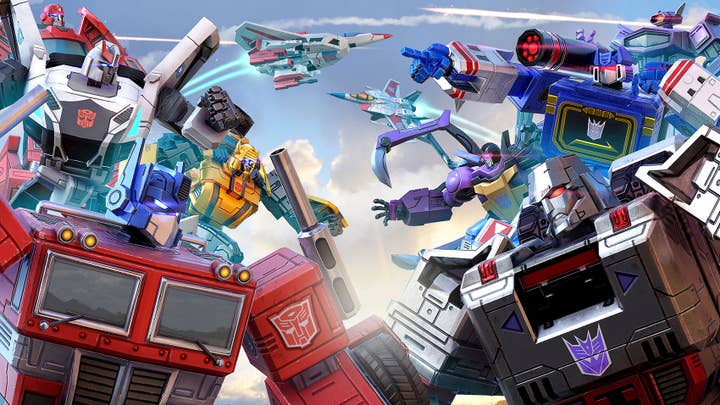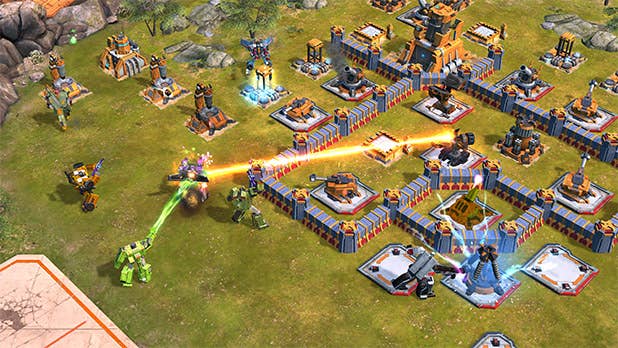“Some think live ops is a sweatshop churning out content. It doesn't have to be that way.”
Space Ape Games believes live operations are essential to success today, but there's a learning curve to conquer first
As has so often been said at industry conferences over the past few years, a game's launch is only the beginning. In the world of free-to-play especially, consumers have come to expect regular incentives to keep playing their chosen title, be it new content, new features or a community event that gives them a reason to login every day.
Such things are most often handled by the live operations team, a relatively new discipline that dedicates itself to ensure a game continues to run, engage with the community and drive retention in the months and ideally years beyond launch.
In November, Space Ape Games - the UK studio behind Samurai Siege, Rival Kingdoms and Transformers: Earth War - invited fellow developers to its headquarters to discuss the growing importance and best practices of live ops, and CEO Simon Hade told GamesIndustry.biz he believes the time will soon be upon us when no company can ignore this aspect of running a game.

"You're going to see more and more gaming in the grossing charts that are powered by live ops," he predicts. "It's quite rare to look at the Top 50 grossing charts in China or Korea, and to a lesser extent Japan, and see a game that does not have live ops as a significant part of it. In the West, there's maybe six or seven in the Top 30 that have live ops, and even that's a stretch for some of them.
"But if you go to the Top 60 grossing, nearly half of them have live ops. That's very different to a year ago, so that's just going to increase demand. For your game to be successful, you'll need to be able to operate efficiently as a server. You'll get the odd outlier, the exception to prove the rule, but I think the expectations of players and economics of the industry will force people to head in this direction."
He added that live ops primarily serve to retain users and increase engagement: "It does not necessarily guarantee downloads. What it ensures is that if you get some traction with your game, you're able to more safely and predictably turn that into a sustainable business."
"If you go to the Top 60 grossing, nearly half of them have live ops. That's very different to a year ago"
Simon Hade, Space Ape
If you're developing a title, particularly one that hinges on multiplayer and community such as a mobile base-building strategy title, it's important to plan for a live ops strategy from the very beginning.
"There are a lot of design decisions you need to make with live operations in mind," says live ops lead Andrew Munden. "If you're designing a game and planning on live operations, you need to be really flexible. Your system needs to be able to take in changes and small variations - like increasing the health of a unit - and doing so every two weeks. Traditional game designs don't support that kind of thing.
"You also need to be mentally preparing your team for the cadence and reality of running a live ops game. It's quite different from shipping a boxed product. It's living, breathing, constantly evolving and you're always getting feedback. So the earlier you prepare a team for that, the better your results are going to be."

"Your system needs to be able to take in changes and small variations every two weeks. Traditional game designs don't support that kind of thing"
Andrew Munden, Space Ape
While Munden stresses that it's ideal to design for live ops from the beginning, he also acknowledges that "most of the games I've joined have set up their live ops cadence after the fact." Hade, meanwhile, warns that it's risky building an infrastructure and tools to support such operations if you have yet to finalise the core game loops and prove they have appeal. Simply keeping live operations in mind while designing this crucial part of your title will ensure "you don't close off the doors inadvertently".
A primary reason to incorporate live operations into your game is to extend the title's lifecycle well beyond launch. Community events and content drops have helped keep some of the market's leading mobile games as active now as they were when first releasing years ago - and in some cases, more active. As much as any developer hopes they have a hit on their hands that will last for years, perhaps decades, how far ahead should they be planning?
"At least a year," says Munden. "And if things don't work out, you should really be building your live ops tech in a way that's still beneficial to you as a company. A lot of our tech here is transitioning between games anyway. We'll build something that we can put onto a new game so even if it didn't work out for us, we'd still have this beneficial piece of tech.

"Make sure you have the content to support the game for a year - that gives you the time to roll out some key features, gain some key learnings, and also to make any big changes. I've found that if you're on a game and you need to make some monumental changes, they usually take about three to six months to put into effect - and I'm talking about huge things, like completely revamping the economy. If you have that year's worth of leeway, that's ideal for that level of tweaking."
Hades stresses: "That doesn't necessarily mean building a year's worth of stuff. With Transformers, the main content is the bots. To prepare for a year's worth of content didn't mean we needed to make a year's worth of bots when we launch. It just means we need to know that we can do it. It's about understanding how long it takes for us to make a bot - if it takes us a month to do one, that means we're only going to have 12 after a year.
"Sometimes it's just about getting the workflows in place to be able to do it, and making sure the architecture of the game allows you to add these things easily. It doesn't necessarily mean you have to build all these things that will never get used."
"Some other companies that do live ops, the image is that the live ops team is like a sweatshop churning out new stuff. It doesn't need to be that way"
Simon Hade, Space Ape
There are two key pillars when it comes to increasing user engagement: new content and features, and community events. Both stimulate a game's audience in their own way, and developers may find that what works most effectively for their title is different compared to their competitors. For Space Ape, it's the latter that often pays dividends.
"With a new feature, we see increases in engagement and interaction and then overtime it will probably come back to the baseline we were at before," Munden explains. "The events are very social, and they involve the greater part of your alliance or guild, and if we run them consistently they have a much bigger impact."
Hade adds that, for his studio at least, the two aren't entirely separate: "We very rarely ship a feature that was not intended for live ops. For example, in Transformers we just launched the combiner feature: a massive mega robot where you combine six bots together. The actual release of that feature is a non-event; we had a few people pile on and get it.
"But the point of that feature was to lay the foundation for six months' worth of content and events themed around combiners. We saw the real impact of that feature kick in in the subsequent events, so it was spread out over a longer period of time and much more effective. We will not ship a feature in a game unless it is tied to a series of events. It's a much more efficient way of running the game."

"We will not ship a feature in a game unless it is tied to a series of events. It's a much more efficient way of running the game"
Simon Hade, Space Ape
Various games in the mobile space have experimented with different frequencies for their community events. To date, Pokémon Go has only run a handful around holidays such as Halloween, Christmas and New Year, tweaking the types of monsters that most commonly appear in order to retain active users and entice back those who have fallen away from the game. Titles such as The Simpsons: Tapped Out have a monthly update, whereby a new game mechanic or content is introduced with their own goals and rewards but largely disappears when the next event rolls out.
Munden says Space Ape prefers to release something new on a much more regular basis, with an event planned for every weekend. This is largely because the studio knows that's when its audience has the most free time and is more susceptible, perhaps willing to be engaged by extra content. However, to avoid fatigue the firm varies the intensity of each week's event; some weeks may require a lot of active participation from users, while others are more relaxed affairs. It's not always effective, but as Munden observes: "If we're not offering anything, you can't expect engagement".
Hade adds that Space Ape events are highly reactive: "We'll look at stats, look at the community feedback. One of the rookie mistakes studios make when getting into live ops for the first time is they'll write a big, high-powered event, they'll see the revenue and engagement spike and they'll think they need to do that every week. But, especially for these communities and clan-driven games, those type of events deliver a tremendous amount of fatigue.
"We've this found out through trial and error over the years and from our experience at previous companies. We offer something every week, but we've balanced the intensity so people don't get bored or burnt out. And it needs to be the right level of challenge - our top players want us to do a bigger event every week, but the more casual players don't want that. There's no magic formula - you just have to keep an eye on it, be reactive and balance it."
"As live ops matures as a role, we'll see a lot more sharing of ideas and probably even some best practises"
Andrew Munden, Space Ape
Developers also shouldn't feel the pressure to constantly offer new events and content. While players will often welcome fresh ideas, they will also be pleased to see returning favourites. Hade offers the example of exploding rams in Samurai Siege, a unit fans are always happy to see added back into the game. Having such crowd-pleasing back-up content makes it easy to execute events when the studio's resources are needed elsewhere.
That said, live operations is not supposed to be as resource-intensive as you might think. The team managing this for Space Ape is just a handful of people, and Munden stresses that live ops specialists don't even need to be "that techy". This is something the market will come to learn as the role mature.
"Live ops is one of the newer positions in the games industry, there aren't a lot of people with a huge amount of experience," he says. "Look for someone who likes games, so they have a gut instinct on what things will work well - especially in free-to-play. Ideally, someone who has had experience working with users - customer support or community management is a great background for live ops. You really have to understand these aren't numbers you're working with, they're people.
"There's not really a whole lot of sharing between live ops people usually. Some companies really covet their live ops secrets, they think what they're doing is really unique and secretive. That's not often the case - they might just be doing it a little better than someone else. As live ops matures as a role, we'll see a lot more sharing of ideas and probably even some best practises."
Looking for these qualities will enable studios to minimise the amount of staff and resources that live operations requires - and that's the point. While many studios have transitioned to a games-as-a-service model in recent years, as titles begin to have a much longer tail and requiring more support beyond launch, live operations shouldn't take away from your ability to work on new projects. Similarly, live ops is not supposed to be a factory producing an endless stream of community events and new content - it is meant to be far more considered, taking user feedback and player behaviour into account as you work out the best way to increase engagement and participation.
"Some other companies that do live ops, the image is that the live ops team is like a sweatshop churning out new stuff," says Hade. "It doesn't need to be that way. That's usually a symptom of bad tools and bad planning, or a legacy business you've tried to bolt live ops onto. If you think about it from the get-go, you can preempt these problems."








